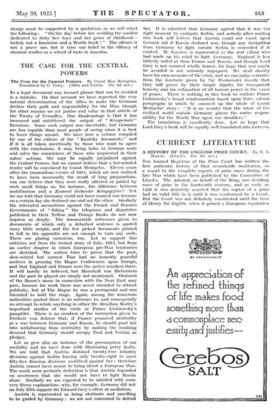THE CASE FOR THE CENTRAL POWERS
The Case for the Central Powers. By Count Max Montgelas. Translated by C. Vesey. (Allen and Unwin. 10s. 6d. net.) IN a legal document any inexact phrase that can be avoided is a mistake. On that account we have regretted the very natural determination of the Allies to make the Germans declare their guilt and responsibility for the War, though for other reasons we see justice and value in that article of the Treaty of Versailles. One disadvantage is that it has increased and embittered the output of " Kriegschuld" literature. Some such output was inevitable, but Germans are less capable than most people of seeing when it is best to leave things unsaid. We have here a volume compiled by one of the editors of the " Kautsky documents," and if it is all taken uncritically by those who want to agree with the conclusions, it may bring balm to German souls and salve the consciences of those who acquiesced in their rulers' actions. We may be equally prejudiced against the Central Powers, but we cannot believe that a fair-minded reader will be convinced by Count Montgelas. Eleven years after the tremendous events of 1914, which are now realized to have been necessarily the result of long preparations, can one believe that they were really affected or guided by such small things as, for instance, the difference between mobilization and a Zustand drohender Kriegsgefahr ? Yet we are told that Germany could not have wanted war because on a certain day she declared one and not the other. Similarly the reiterated accusations against the French and Russian Governments of " faking " the telegrams and dispatches published in their Yellow and Orange Books do not now impress us deeply. The innumerable references given to documents of which only a detached sentence is quoted carry little weight, and the few picked documents printed in full in the appendix are not enough to turn any scale. There are glaring omissions, too. Let us support this criticism not from the heated story of July, 1914, but from an earlier chapter in which European pre-War tendencies are sketched. The author tries to prove that the poor, slow-witted but earnest Tsar had no honestly peaceful motives in pressing the Hague Conferences upon Europe, and that England and France were the active wreckers there. It will hardly be believed, but Marschall von Bieberstein and the part he played arc simply not mentioned. Omission of the Baron's name in connexion with the Near East may pass, because his work there was never intended to attract publicity, but at The Hague he was a protagonist and was intended to hold the stage. Again, among the numerous authorities quoted there is no reference to, and consequently no attempt to refute anything in either Mr. Headlam Morley's important studies of the crisis or Prince Lichnowsky's pamphlet. There is no mention of the instruction given to Freiherr von Schoen that, if France promised neutrality in a war between Germany and Russia, he should goad her into withdrawing from neutrality by making the insulting demand that Germany should occupy Toul and Verdun as pledges.
Let us give also an instance of the presumption of our credulity and we have done with illustrating petty faults. We are told that Austria destined twenty-two infantry divisions against Serbia leaving only twenty-eight to meet fifty-five Russian divisions mobilized against her : therefore Austria cannot have meant to bring about a European War. The much more probable deduction is that Austria depended on assurances that she would not have to fight Russia alone. Similarly we are expected to be satisfied with some very flimsy explanations, why, for example, Germany did not on July 25th support Sir Edward Grey's effort at mediation.
Austria is represented as being obstinate and unwilling to be guided by Germany : we are not concerned to defend her. It is admitted that Germany agreed that it was the right moment to castigate Serbia, and nobody after reading this book will believe that Austria could not count upon German aid if Russia declared war, though any instigation from Germany to fight outside Serbia is concealed if it existed. M. Sazonov is represented as the real villain who had made up his mind to fight Germany. England is less bitterly railed at than France and Russia, and though Lord Grey is not counted wholly honest, his hope that war might be avoided is not seriously impugned. We shall shortly have his own memoirs of the crisis, and we can judge certainly from the foretaste given by the Westminster Gazette that they will prove by their simple dignity his transparent honesty and his exhaustion of all human power in the cause of peace. There is nothing in this book to confute Prince Lichnowsky's broad condemnation based upon three solemn paragraphs in which he summed up the whole of Count Montgelas' story : " It is no wonder that the whole of the civilized world outside Germany places the entire respon- sibility for the World War upon our shoulders."
The translation is excellently done. Let us hope that Lord Grey's book will be equally well translated into German.










































 Previous page
Previous page